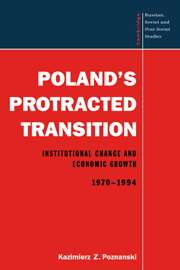Book contents
- Frontmatter
- Contents
- Preface
- Introduction: Research agenda, conceptual model and principal findings
- Part I Imperfect decentralization, broken political contracts and foreign-debt crisis
- Part II Economic reforms, divided society and ‘growth fatigue’
- Part III Communist legacy, ‘shock therapy’ and economic recession
- 7 Costly transition to ‘hard’ markets
- 8 Political coalitions and property reforms
- 9 The paradox of continuity in change
- Appendix
- Notes
- References
- Index
- Titles in the series
9 - The paradox of continuity in change
Published online by Cambridge University Press: 29 October 2009
- Frontmatter
- Contents
- Preface
- Introduction: Research agenda, conceptual model and principal findings
- Part I Imperfect decentralization, broken political contracts and foreign-debt crisis
- Part II Economic reforms, divided society and ‘growth fatigue’
- Part III Communist legacy, ‘shock therapy’ and economic recession
- 7 Costly transition to ‘hard’ markets
- 8 Political coalitions and property reforms
- 9 The paradox of continuity in change
- Appendix
- Notes
- References
- Index
- Titles in the series
Summary
Building on our empirical findings about the pattern of post-1989 developments as well as on previous determinations on earlier years going back to 1970, this final chapter of the book attempts to offer a new, broader perspective on Poland's development – seen as an important case in the region. The initial phase of Gierek's import-led economic strategy and the period of Jaruzelski's anti-recession policy, as well as the most recent stage of radical reforms by postcommunist leaders, might look like distinct, isolated events because so many major changes occured in each of them. This might seem particularly true with respect to the post-1989 years that are viewed by many economists and political scientists as a sort of revolution, but even here one can find a great amount of artefacts from the past. Our analysis in the book indicates, that in many respects all these stages form an integrated whole, which is best captured by the title phrase – protracted transition.
We make an effort to show most critical elements of this continuity in change and not of mechanical continuity – repetition of the past, for this is exactly what we have found in our examination of Poland between 1970 and 1994. It is the stress on continuity in change that distinguishes our own approach from those that are offered – or implied – by both the totalitarian or modernization schools (more see Janos 1986).
- Type
- Chapter
- Information
- Poland's Protracted TransitionInstitutional Change and Economic Growth, 1970–1994, pp. 245 - 289Publisher: Cambridge University PressPrint publication year: 1997



